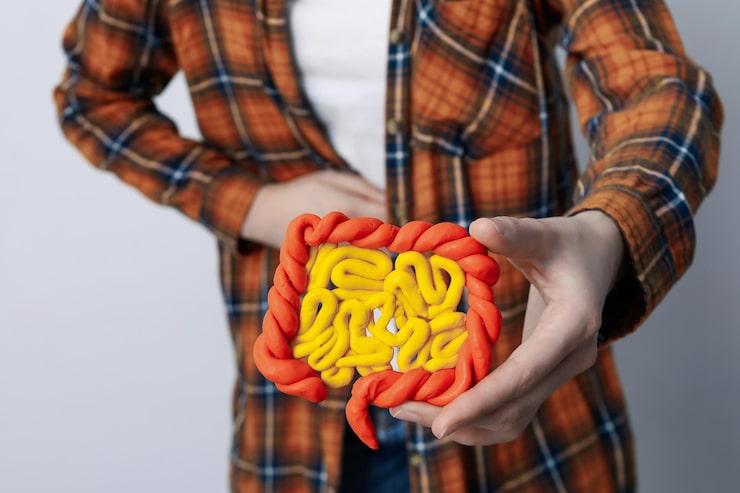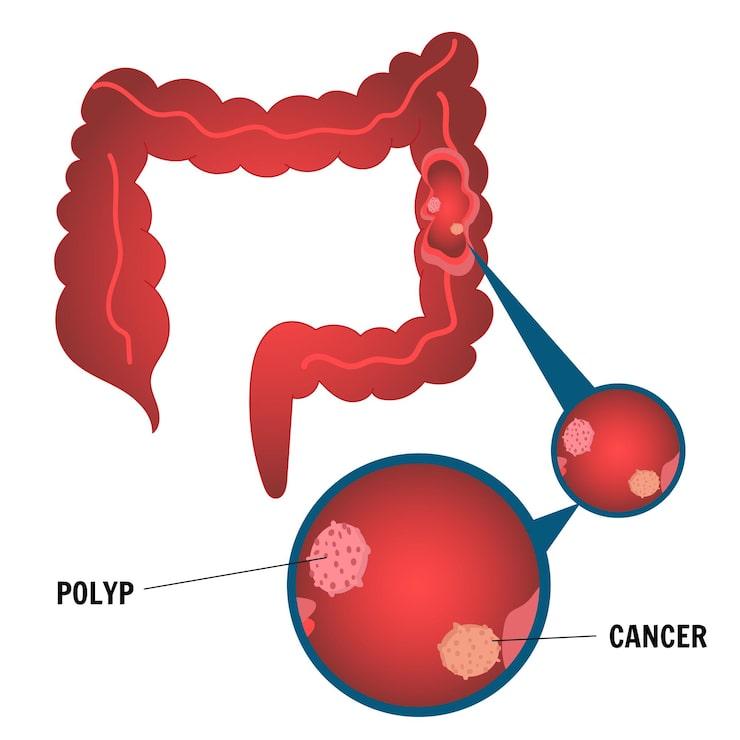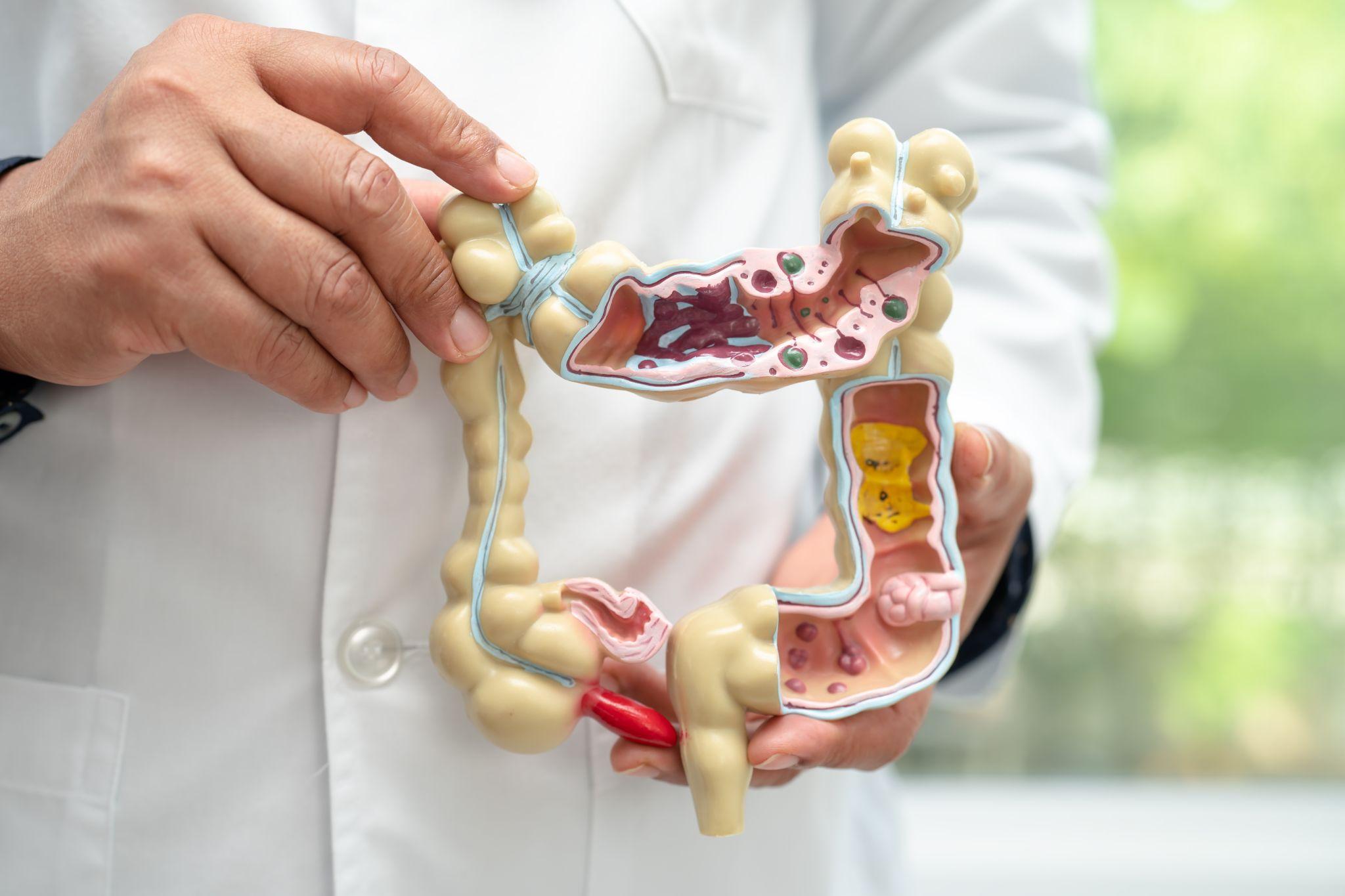
person suffering from colon polyps
The human digestive system is a well-oiled machine that breaks down food, takes in nutrients, and gets rid of waste. The colon, or big intestine, is an important part of this system. But like any other organ, it can get sick, and one of the most serious problems is colon polyps. Some polyps can evolve into colon cancer, which is one of the most common causes of cancer deaths globally.
To stop colon polyps from happening, find them early, and treat them, you need to know what they are, what causes them, and how they are related to colon cancer. This site talks about all you need to know about colon polyps and how to keep your digestive health in good shape.
Colon polyps are tiny lumps that grow on the inside of the colon or rectum. They happen when cells in the colon expand and divide in a way that isn't normal, forming groups of tissue. Most polyps are not carcinogenic, but some forms can slowly change into dangerous tumors if they are not treated.
There are several kinds of polyps, and each one has a distinct chance of turning into cancer:
The most common form, making up around 70% of all polyps.
They are called "precancerous" because they can turn into colon cancer over time.
Usually tiny and situated in the sigmoid colon or rectum.
Usually low danger; however, some may need to be watched.
Look flat and are tougher to find during a colonoscopy.
If you don't treat them, they have a high chance of turning into cancer.
People with inflammatory bowel illnesses (IBD), like Crohn's disease or ulcerative colitis, often have this.
Not usually precancerous, however, they do mean that the colon is still inflamed.

Image displaying how polyps are different from cancer
Polyps originate when cells grow unusually, but there are several things that make it more likely that someone will have them:
Most colon polyps don't create any symptoms, which is why screening is so important. But when symptoms do show up, they can be:
Not all polyps become cancer; however, almost all colon cancers start as polyps. The change happens slowly:

An Anatomical Model Of The Intestine Displaying Polyps
There are several tests that can find colon polyps:
The best way to find and get rid of them.
A camera on a flexible tube looks at the colon, and polyps can be taken out during the treatment.
Looks at just the lower section of the colon.
Less intrusive, however, it might overlook polyps in the upper colon.
Find alterations in blood or DNA that are linked to polyps.
Not invasive, but not as accurate as a colonoscopy.
Uses scans to find growths.
If polyps are discovered, a follow-up colonoscopy is needed.
You can't stop all polyps from occurring, however, changing your lifestyle and getting medical care can lower your risk a lot:
1. Regular Tests
Start having regular colonoscopies at 45 (sooner for people who are at high risk).
The frequency depends on the test results and the family's medical history.
2. A healthy diet
Eat more foods that are high in fiber, like fruits, vegetables, whole grains, and nuts.
Don't consume too much red meat or processed meat.
3. Keep your weight in check
Being overweight makes you more likely to get polyps and colon cancer.
4. Keep Moving
Exercise regularly is good for your digestion and lowers your chance of cancer.
5. Don't smoke and limit how much alcohol you drink.
Both habits make polyps and cancer more likely to happen.
6. Take care of your health issues
Control your diabetes, high cholesterol, and other long-term health problems.
The main way to treat polyps is to remove them, which is usually done via a colonoscopy. Some of the methods are:
If you've had polyps before, you're more likely to get them again. Following your doctor's advice on when to have a colonoscopy is one of the steps for continuous care.
Colon polyps may sound scary, but most of the time, they are easy to deal with, especially if you catch them early. The major worry is that they could turn into colon cancer, which can be prevented and treated very well in its early stages.
You may greatly minimize your risk by getting frequent checkups, making healthy choices, and getting treatment when you need it. Always remember that it's better to avoid getting sick than to treat it. Taking care of your gut health now could save your life tomorrow.
If you are over 45, have a family history of colon cancer, or have symptoms like rectal bleeding, you should see a gastroenterologist to talk about the best ways to get screened and treated. Make sure to get screened by the experienced doctors at Prakash Hospital, Noida.
A healthy colon is the key to a healthy future. Do everything you need to do today to safeguard yours.
We offer expert care across key specialties, including Medicine, Cardiology, Orthopaedics, ENT, Gynaecology, and more—delivering trusted treatment under one roof.
Prakash Hospital Pvt. Ltd. is a 100 bedded NABH NABL accredited multispecialty hospital along with a center of trauma and orthopedics. We are in the service of society since 2001.
OUR SPECIALITIES
Contact Us
D – 12A, 12B, Sector-33, G. B. Nagar, Noida, Uttar Pradesh 201301
+91-8826000033

© 2026 All rights reserved.
Designed and Developed by Zarle Infotech